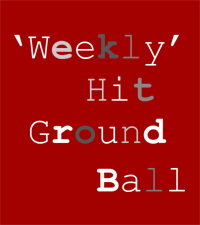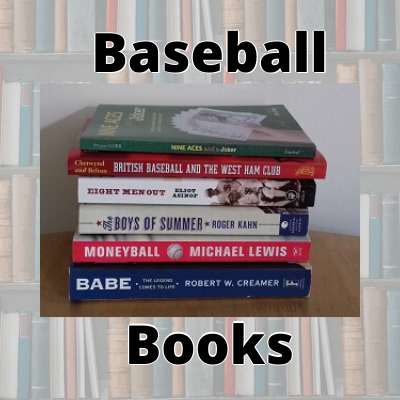Recently, I wrote about the history of British clubs in European competitions sanctioned by the continent’s baseball confederation. Of course, there are many other tournaments held in Europe that bring together teams from different countries, including Britain. For instance, several British teams have forged links with clubs on the Continent, particularly in The Netherlands, and made regular visits to small-scale tournaments that they have hosted.
Probably the two most prestigious tournaments not organized by the Confederation of European Baseball are Haarlem Baseball Week and the World Port Tournament, which take place in The Netherlands in alternating years and now exclusively invite national teams. Haarlem Baseball Week, having started out in 1961, has a richer history than the World Port Tournament (first held in 1985). In the early years, Haarlem Baseball Week invited clubs, military base sides, and regional all-star teams in preference to national teams. Indeed, in that first ever event of 1961, none of the five international invitees were countries. Amazingly, two of the six teams overall were from Britain.
Tournament format and teams
The inaugural Haarlem Baseball Week was run as a round-robin tournament between Saturday 22 and Saturday 29 July, with one game played on the opening day and a pair on every day thereafter. Games were nine innings, with a 10-run mercy rule in effect. A new inning was not to be started once 8pm was reached (the latest start time was 5.30pm). All games were played at the Badmintonpad facility.
The six teams that took part were:
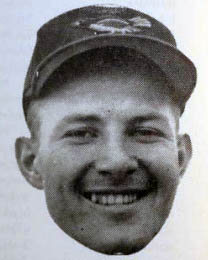
Claus Helmig, player-manager for the Mannheim Knights
- Alconbury Spartans — a US Air Force base team from Cambridgeshire who played games against British regional and national squads, sides visiting from overseas, and other military teams, from both the UK and abroad. Interestingly, a couple of the players on the roster in 1961 had the same names as minor leaguers listed on Baseball-Reference who would have been in their early 30s in 1961 (Bill Blanton and Don Gilmore).
- Châteauroux Sabres — a US Air Force team from central France.
- London All Stars — a Southern Baseball Association select side.
- Kieviten — the Dutch word for “lapwings”, which was used as a moniker for a squad that was essentially the Netherlands national team. Their ranks included Han Urbanus, a shining light of Dutch domestic ball in the 1950s.
- Mannheim Knights — one of the top teams in the German Bundesliga at the time. Player-manager Claus Helmig had been signed to a minor league contract in the Baltimore Orioles organization five years earlier.
- Wiesbaden Flyers — a US Air Force team from western Germany.
The London All Stars
The London All Stars were managed by Art Abbott, who was involved in an administrative capacity with the Southern Baseball Association and who would go on to manage Great Britain, against a Dutch junior national side, four years later.
The Southern Baseball Association, from which the squad was drawn, consisted in 1961 of:
- eight top-tier teams (Bushy Park Cardinals, Essex Tigers, Ford Sports, Kodak, Navy Blue Jackets [London], Richmond Red Sox, Sutton Beavers, and Thames Board Mills);
- a further nine sides in division one (Bluejays [Dulwich], Crawley Braves, Crawley Pirates, Crawley Giants, Edwards Eagles, Hackney Dodgers, Romford Rockets, Twickenham Cardinals, and Vitamins Magpies [Crawley]); and,
- two associate members (BSP Sports Club and Richmond Knights).
The London All Stars’ roster was selected as follows.
Pitchers
- Terry Warner — Southern Baseball Association club representative in 1961 for Thames Board Mills, who he won national titles with in 1959 and 1960, a player for Great Britain in their silver-medal-winning 1967 European Championships, and future British Baseball Hall of Famer.
- John Booth — a player with the Richmond Red Sox in the early 1960s.
- John Campbell — a player with Thames Board Mills in the early 1960s who went on to make the roster in Great Britain’s silver-medal-winning 1967 European Championships.
- Brian Hart — a player with Thames Board Mills in the early 1960s.
- Don Tinton — a player with Ford Sports in the early 1960s.
- Geoffrey Hubbard.
Catchers
- Ray Reynolds — double national champion with Thames Board Mills in 1959 and 1960 who went on to make the roster in Great Britain’s silver-medal-winning 1967 European Championships.
- Peter Staples — a player with Kodak and the Richmond Red Sox in the early 1960s who went on to play for Great Britain in their silver-medal-winning 1967 European Championships.
Infielders
- Jimmy Wertz — a roster member for Great Britain’s European Championship qualifier against West Germany in 1975.
- Stanley Russell — Southern Baseball Association club representative for Kodak in 1961.
- Bill Dawber — Great Britain international, double national champion with Thames Board Mills in 1959 and 1960, and future British Baseball Hall of Famer.
- Tony Cross — a British civilian who played with US Navy sides in the early 1960s.
- Frank Adey — a player whose successful domestic career extended back to the late 1940s (he was the leading run scorer in the London West League in 1948, for instance) and who represented Great Britain in 1952.
Outfielders
- Don Sinclair — double national champion with Thames Board Mills in 1959 and 1960.
- Eldon Peerenboom.
- Alan Aley — Southern Baseball Association club representative for the Essex Tigers in 1961 who went on to make the roster in Great Britain’s silver-medal-winning 1967 European Championships.
- Art Bloomfield — father of future British Baseball Hall of Famer, Alan Bloomfield.
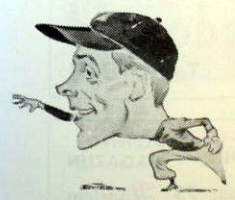
Cartoon from the tournament programme of Han Urbanus, who went 1-for-4 in the opening game for Kieviten
The games
Most results and game details come from game summary sheets produced during the course of the tournament (and preserved and lent to me by Bill Dawber’s daughter). Some additional colour comes from newsletters produced during the 2006 Haarlem Baseball Week (archived on www.honkbalweek.nl), while a full set of results published on www.barrysport.nl allowed me to fill the remaining gaps.
If any further information materializes, I can add updates to this article or publish a second version.

Nol Houtkamp, who went 1-for-3 and scored a run in Kieviten’s victory over the Sabres
Day one (Saturday 22 July)
16h30 Kieviten 4–0 Châtearoux Sabres
A crowd of 2000 was present for the opening ceremony, at 4pm on a cold, rainy day, where a marching band played and Councillor DJA Geluk threw out the ceremonial first pitch.
The contest pitted Kieviten’s Herman Beidschat, one of top pitchers in the Dutch league in the 1950s and 1960s, againt Byron Skelton of the French base side.
The first hit was delivered by Ricky Kersout, Beidschat’s trusted catcher. He singled in the top of the third and came round to score the opening run of the tournament on a Henk Keulemans double.
Beidschat nursed that 1-0 lead all the way through to the top of the seventh. In that half-frame, Hennie Regleing hit a solo blast and Kersout also homered — this time with a runner, Nol Houtkmap, on base — to make the score 4-0 to the Dutch. This is how the game ended, with Beidschat pitching a four-hit shutout, dotted with six strike-outs. Skelton also struck out six in taking the loss.
Day two (Sunday 23 July)
10h00 London All Stars  2–12 Wiesbaden Flyers (6 innings)
The first morning game of Haarlem Baseball Week saw the London All Stars get their campaign off to a rather shaky start. They took the field in the bottom of the first having gone down without a fight in the top of  the inning. Terry Warner was handed the ball for London but did not make it out of the first, giving up 4 runs on two hits before being replaced by John Booth. The damage was 7 runs by the time the All Stars got the third out. A grand slam blow by pitcher and number-nine hitter Leroy Prater brought in the majority of those tallies.
Later in the game, Prater hit a second home run, a 3-run shot in the bottom of the sixth that took the score to 12–2, Â brought the mercy rule into effect, and terminated 99 minutes of misery for the Brits. Prater pitched all six innings, striking out six and yielding a solitary hit, to London captain Bill Dawber. Don Tinton and Peter Staples scored London’s runs.
London’s starting line-up: Cross (ss), Sinclair (rf), Adey (2b), Staples (c), Tinton (lf), Bloomfield (cf), Russell (3b), Dawber (1b), Warner (p).
15h00 Mannheim Knights 6–5 Kieviten
In the day’s second game, the Knights’ John Parker duelled with Kieviten’s Ruud Zijlstra. The game stood at 3–2 to the Dutch team after five innings. Kieviten extended their lead to 5–2 in the sixth, an advantage they preserved into the eighth. At this point, Ziljstra lost his grip on the battle. He gave up 4 runs and thus the lead and was relieved. Parker, who had been fanning batter after batter, silenced Kieviten for the final two frames to seal a complete-game three-hit victory. He finished with a cool 20 strike-outs.
Day three (Monday 24 July)
11h00 Mannheim Knights 1–11 Châtearoux Sabres (8 innings)
After being shut out by the Dutch team in the event’s opener, the Sabres broke open their tournament in style, hitting three home runs en route to an 11–1 Â mercy-rule triumph. Winning pitcher Jim Lipari struck out eight.
17h30 Wiesbaden Flyers 1–11 Alconbury Spartans (? innings)
In this all-base-team clash, Cambridgeshire’s Alconbury Spartans made light work of the team that had swept aside the London All Stars in their opening contest, inflicting an 11–1 reverse on their German foes.
The result left the Dutch squad, the French base team, and the two German entries all with a 1-and-1 record. The Spartans sat top (1-and-0) with the London All Stars at the other end of the standings (0-and-1).
Day four (Tuesday 25 July)
11h00 Châtearoux Sabres 13–0 London All Stars
For London’s second clash, Bill Dawber was promoted from eighth to second in the batting order and Ray Reynolds entered the line-up in the clean-up spot as catcher. Sadly for the All Stars, this shuffle did not kickstart the offence. For the Sabres, Don Moore threw Haarlem Baseball Week’s first no-hitter and gunned down 14 by way of strike-out in the process. He walked one.
John Booth took the loss for London, giving up 11 hits and receiving little help from his fielders, who combined for five errors in the contest. Dawber and John Campbell appeared in relief.
Right-fielder and clean-up hitter Jack Patton had his second straight game with a home run for the French team, while shortstop Guy Smith also homered as part of a 4-for-5 showing.
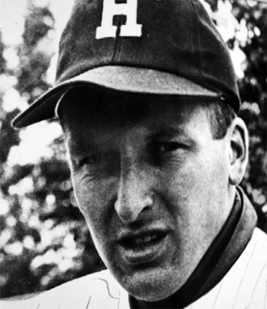
Herman Beidschat, Kieviten’s losing pitcher against Alconbury (courtesy of honkbalweek.nl)
London’s starting line-up: Cross (ss), Dawber (1b), Sinclair (rf), Reynolds (c), Tinton (lf), Bloomfield (cf), Russell (3b), Wertz (2b), Hubbard (p).
17h30 Kieviten 0–8 Alconbury Spartans
The Spartans sent Ron Ellison to the mound, who returned the second pitching gem of the day. His one-hit shutout was peppered with 13 strike-outs and he gave up only two walks. Dutch starter Herman Beidschat struck out seven and walked only one but he yielded 11 hits over 5.2 innings on his way to the loss.
Alconbury did all of their offensive damage in two batches: a 3-run fourth and a 5-run sixth. Art Farabee was 3-for-4 on the day, while Chuck Imbriale and Danny Marchant both drove in a pair of runs.
Henk Keulemans had Kieviten’s only hit.
The win moved Alconbury half a game in front of the Sabres at the head of the standings.

Spartan Don Gilmore slides past Kieviten second-baseman Henk Keulemans (courtesy of Dutch National Archives)
Day five (Wednesday 26 July)
11h00 Mannheim Knights 12–3 London All Stars
Peter Staples returned as catcher but Ray Reynolds was kept in the line-up, moving to left-field. Frank Adey came back in at second base, and Dawber was shifted to the fifth spot.
Having amassed a solitary hit across their opening two contests, the All Stars would have been delighted to reach double digits in this game, with a total of 10. Mannheim had four more hits than London and — crucially — made nine fewer errors (two versus 11). That sloppiness in the field was London’s undoing.
On the mound for the All Stars, Don Tinton struck out seven and walked three. With the bat he went 4-for-4, including a solo home run in the fifth, and scored all three of London’s runs. Bill Dawber went 2-for-4, Tony Cross 2-for-5 (with a pair of RBI), Stanley Russell 1-for-3, and Don Sinclair 1-for-4.
Claus Helmig drove in and scored 3 runs for the Knights. His team’s 5-run outburst in the top of the ninth removed the glean of respectability in the scoreline for London.
London’s starting line-up: Cross (ss), Sinclair (cf), Adey (2b), Staples (c), Dawber (1b), Russell (3b), Reynolds (lf), Tinton (p), Campbell (rf).
17h30 Châtearoux Sabres 7–8 Wiesbaden Flyers
This all-base-team match-up was memorable both for its close score and for the fact that plate umpire Hans Schotel had to be relieved from his duties when he got dust in his eyes.

Alconbury Spartans’ Anibal “Nibby” Olivera, who batted a perfect 1.000 from the lead-off spot in the all-British clash with the London All Stars (courtesy of Dutch National Archives)
Wiesbaden were now Alconbury’s closest challengers, at half a game back.
Day six (Thursday 27 July)
11h00 London All Stars 1–12 Alconbury Spartans (6 innings)
Among a set of changes made by London manager Art Abbott for this all-British clash, he installed himself in the line-up in place of Bill Dawber at first base, batting second. Tony Cross was made captain on the field.
Jeff Hubbard was given the start for London, with his opposite number being Vince Balint.
Hubbard lasted only an inning as he walked three and gave up 2 runs on a Danny Marchant roundtripper. Pitching in relief for the All Stars were Brian Hart and Bill Dawber.
A second home run for Billy Marchant, in the bottom of the fifth (taking his runs batted in tally for the game to five), powered a 4-run rally that pushed Alconbury’s lead to 12–0.

Don Merchant is congratulated by his Alconbury Spartans team-mates after a home run, one of two he hit in the game versus the London All Stars (courtesy of the Dutch National Archives)
London needed to plate 3 runs in the sixth to keep the game alive; they managed only one, driven in by Reynolds and scored by Don Tinton. Reynolds was 1-for-2 in the game, while Tinton and Frank Adey both went 1-for-3.
At least London’s fielding was tidier, with their error count being trimmed to three.

London All Star Brian Hart fails to prevent a Spartan from scoring (courtesy of Dutch National Archives)
London’s starting line-up: Cross (ss), Abbott (1b), Staples (c), Tinton (cf), Adey (2b), Reynolds (lf), Booth (3b), Aley (rf), Hubbard (p).
17h30 Kieviten 6–7 Wiesbaden Flyers
Kieviten’s faint hopes of claiming the first Haarlem Baseball Week title fizzled out completely with a 1-run defeat to Wiesbaden. The Flyers were by now the only realistic challengers to Alconbury.
In this game, Kieviten’s manager Ron Fraser played himself in right-field. He came to bat twice, scoring after drawing a walk and also striking out. The day was more memorable for him for another reason: in the United States his daughter Linda was born.
Day seven (Friday 28 July)
11h00 Wiesbaden Flyers 12–2 Mannheim Knights (6 innings)
Wiesbaden confirmed their strength as the tournament’s second-best team, with a mercy-rule defeat of the other German team.
Jim Greenville twirled a two-hitter, with four strike-outs and four walks, to gain the win. The delightfully named pairing of Harry Golden and Joe Jablonski both hit a home run in the Flyers’ winning effort.
John Parker, who had been so dominant in his tournament debut, took the loss. His wildness (eight walks in six innings) was certainly a major contributing factor.
17h30 Alconbury Spartans 8–5 Châtearoux Sabres
Tom Willwerth pitched a steady nine-inning complete game to guide the Spartans to victory in their first close contest of the tournament. Don Moore, Jim Lipari, Byron Skelton, and Dick Draper all appeared on the mound for the Sabres.
The Sabres scored first, in the bottom of the first; however, Alconbury responded in the next frame, aided by an Art Farabee dinger, to move out into a 3–1 lead.
The French team fought back in the fourth to tie the game, and, after the Spartans regained the lead in the fifth, scored twice more in the sixth to seize a 5-4 advantage.
Singleton tallies for Alconbury moved them level in the seventh and ahead in the eighth, and it was only when two runs crossed in the top of the ninth (one of them on a solo homer from Bobby Hunt) that Willwerth gained some breathing space.
Day eight (Saturday 29 July)
10h00 Alconbury Spartans 15–2 Mannheim Knights (? innings)
The Spartans sealed the title in fitting style with another lopsided victory.
Alconbuiry scored 54 runs and conceded only 9 over the duration of the event. The 5-and-0 champions earned permanent and prominent placement of Britain’s flag in the history books of Haarlem Baseball Week.
15h00 London All Stars 2–15 Kieviten (? innings)
London’s campaign ended with further disappointment as they fell all to easily to Kieviten.
While the evidence suggests the All Stars were over-matched throughout the event (with the possible exception of their game against Mannheim), just being at the tournament really was an achievement in itself.

London All Star Bill Dawber’s medal of participation from 1961
In this final contest, Nol Houtkamp went 3-for-4 to confirm his status as the Dutch team’s best hitter of the first Haarlem Baseball Week.
London line-up: unknown.
Final standings and player awards
Final standings
Place..Team................W..L..RS..RA...GB
1st Alconbury Spartans 5 0 54 9 -
2nd Wiesbaden Flyers 4 1 40 38 0.5
3rd  Châtearoux Sabres 2 3 36 18 3.0
4th  Kieviten 2 3 30 23 3.0
5th Mannheim Knights 2 3 23 46 3.0
6th London All Stars 0 5 8 64 5.0
Player awards
Tom Willwerth, of the Spartans, won the pitching award. His team-mate Don Gilmore was named “Homerun King” and joint best batter with London’s Don Tinton. Tinton also claimed joint Most Valuable Player honours. While Tinton certainly played impressively, it’s quite possible that his besting of other strong performers in this category was something of a sympathy vote for the London team.

Chuck Costello, coach for the Alconbury Spartans
The Spartans’ Chuck Costello was, perhaps unsurprisingly, declared best coach.
Epilogue
In 1962, Alconbury Spartans were crowned European US Forces Champions. The following year, the Spartans returned to Haarlem Baseball Week. The event had moved to Pim Mulier stadium, where it is still played to this day. They finished last in the four-team field, with a 1-and-5 record, although their player Bill Sauls won the most popular player award. The team that inherited the Spartans’ title was the Grand Rapids Sullivans, described in the August 1963Â Baseball Courier as “one of the strongest U.S. non-professional teams.”
The tournament’s recent history has brought many rising stars of the game to for a week on Dutch grass. Perhaps most memorably, a young pitcher named Stephen Strasburg appeared for Team USA in 2008, posting a 2-0 record and a 1.93 ERA, with 18 strike-outs and only two walks over 14.0 innings, to help his country to a perfect 7-and-0 record and the title.

